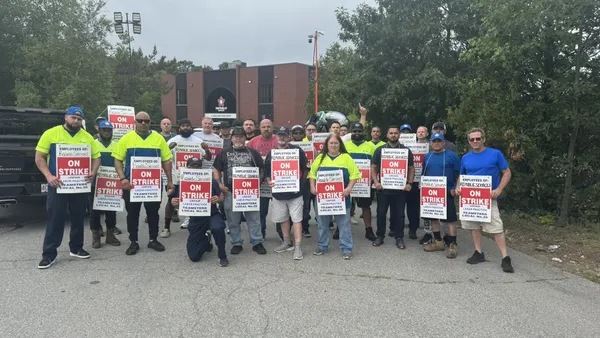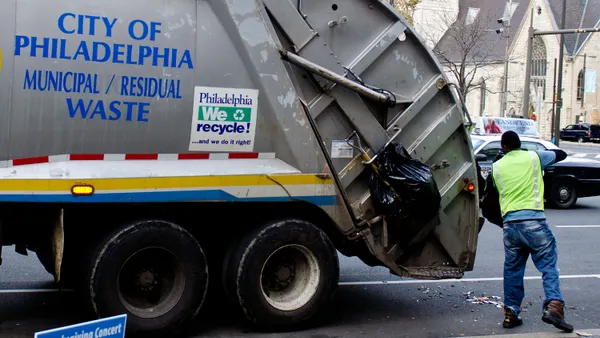Dive Brief:
- A national legislative campaign targeting plastics and the recycling supply chain kicked off Feb. 6 with a screening in Washington, D.C. of the documentary "The Story of Plastic." The film centers on the life cycle of plastic — particularly its climate implications — along with its toll on marine life and ecosystems.
- An accompanying panel featured speakers from environmental groups, including the Berkeley Ecology Center, Texas Environmental Justice Advocacy Services, San Antonio Bay Estuarine Waterkeeper and the Center for International Environmental Law (CIEL). Activists critiqued the role industry has played in plastic pollution and threw their weight behind the soon-to-be introduced Break Free From Plastic Pollution Act.
- Rep. Alan Lowenthal (D-Calif.), a co-sponsor of that bill, kicked off the film with remarks touting the "historic" nature of his upcoming legislation and its emphasis on extended producer responsibility (EPR). "[We need to] put the responsibility back where it needs to be," Lowenthal said.
Dive Insight:
The documentary screening marks the beginning of a public push for the upcoming bill sponsored by Lowenthal and Sen. Tom Udall (D-NM), set to be introduced on Tuesday.
The film focuses on the full life cycle of plastic, from petrochemical plants in Houston, Texas, to marine debris in Indonesia and the Philippines. In addition to focusing on the environmental impacts of microplastics and broader plastic pollution, the documentary also draws links between plastics and climate change.
That thread includes plastic's source — oil refineries — but also incineration. The film takes a strong stand against burning plastics, noting health effects on nearby communities and toxins released through the process. Activists featured in the documentary also embrace "zero waste" efforts and goals to achieve complete organics diversion from landfills and incinerators, coupled with currently unattained 100% recycling rates. Residuals left behind, the film argues, should be phased out of production by industry.
Following the screening, speakers endorsed EPR as an effective approach to combating plastics pollution and indicated they expect minimal buy-in from industry players for such legislation.
Carroll Muffett, president and CEO of CIEL, told Waste Dive he feels prior legislation with significant industry support has fallen short in part because of that backing. He criticized the "Save Our Seas 2.0" Act, which has passed the Senate, as doing little to address underlying supply chain issues.
"Do we need industry buy-in? Yes," Muffett said, seemingly leaving the door open for coalition building with recycling and waste companies. "But we're not looking to get buy-in from fossil fuels, from [the plastics industry]."
Others struck a similar tone. Stiv Wilson, the film's creator and executive producer, commended the efforts of groups like As You Sow, a shareholder advocacy nonprofit. Wilson asserted publicly-traded companies are accountable to shareholders and argued those entities in particular have not honored their responsibilities on an environmental level.
Only an "optics problem" will encourage industry action, he told Waste Dive. "They're not going to do it voluntarily," said Wilson. "They're going to have to be forced."
That mentality could set the stage for a showdown over the Udall-Lowenthal bill when it drops next week. A draft of the bill previewed a national container deposit system, along with mandating recycled content minimums in plastic bottles and packaging, among other items. The legislation would also seek to ban certain single-use plastics, including straws, carryout bags and expanded polystyrene – all of which have come under fire at the state and local level in recent years.
Recycling industry figures have already voiced opposition to the draft, which circulated last fall. The National Waste and Recycling Association (NWRA) publicly came out against the bill in November, calling it "counterproductive." The organization asserted it was "especially troubled by the proposed national container, the one-size fits all approach to recycling collection, and the potential that this bill will lead manufacturers to label items as recyclable even though there is no market for the materials." The Institute of Scrap Recycling Industries has similarly remained wary of the bill, as have a number of plastics groups.
David Biderman, executive director for the Solid Waste Association of North America (SWANA), told Waste Dive his organization has provided feedback on the draft to the lawmakers. He indicated SWANA would assess the legislation when it is unveiled.









